The 1970 Mercury Cougar, a symbol of American automotive prowess, emerged as a captivating blend of style and performance. This model year marked a significant turning point for the Cougar, introducing a bold new design and powerful engine options that cemented its place as a true muscle car icon.
Its distinctive exterior, featuring sharp lines and a prominent grille, demanded attention on the road, while its spacious interior offered a comfortable and luxurious experience.
Under the hood, the 1970 Cougar boasted a range of robust V8 engines, including the legendary 351 Cleveland, capable of delivering exhilarating acceleration and a thrilling driving experience. The Cougar’s combination of performance, comfort, and style made it a popular choice for both enthusiasts and everyday drivers, contributing to its lasting legacy in automotive history.
Introduction: 1970 Mercury Cougar

The Mercury Cougar, a stylish and powerful muscle car, was introduced by Ford Motor Company in 1967 as a sporty coupe variant of the Ford Mustang. It quickly gained popularity for its sleek design and powerful engine options. The 1970 model year marked a significant turning point for the Cougar, ushering in a new era of refinement and performance.
The Significance of the 1970 Model Year
The 1970 Mercury Cougar was a pivotal model for the car’s evolution, featuring a complete redesign that aimed to enhance its luxury and performance appeal. This model year marked the introduction of the Cougar Eliminator, a high-performance variant that offered a potent engine and sporty styling.
The 1970 Cougar also benefited from improvements in its interior, exterior, and suspension, solidifying its position as a formidable competitor in the burgeoning muscle car market.
Key Features and Design Elements
The 1970 Mercury Cougar boasted a distinctive design that set it apart from its predecessor. Here are some of the key features and design elements that made it unique:
Exterior Design
The 1970 Cougar featured a redesigned exterior with a longer hood, a more prominent grille, and a sleek, fastback roofline. The new design emphasized the car’s sporty and luxurious nature.
- Longer Hood:The extended hood contributed to the Cougar’s muscular appearance and provided more space for the powerful engine.
- Prominent Grille:The redesigned grille featured a horizontal chrome bar that extended across the entire width of the front fascia, adding a touch of elegance to the car’s front end.
- Sleek Fastback Roofline:The sloping roofline gave the Cougar a distinctive silhouette that hinted at its performance capabilities. It also improved the car’s aerodynamics, contributing to its overall efficiency.
- Hidden Headlights:The 1970 Cougar featured hidden headlights, which added a touch of mystery and intrigue to the car’s design. This design element was popular in the muscle car era and contributed to the Cougar’s sporty appeal.
Interior Design
The interior of the 1970 Cougar was designed to provide a comfortable and luxurious driving experience.
- Vinyl Bucket Seats:The standard Cougar featured comfortable vinyl bucket seats, while the Eliminator model offered optional leather upholstery.
- Woodgrain Accents:The dashboard and door panels featured woodgrain accents, adding a touch of sophistication to the car’s interior. These accents were popular in luxury cars of the era and contributed to the Cougar’s upscale appeal.
- Full-Length Console:The 1970 Cougar featured a full-length console that ran from the dashboard to the rear seat, adding to the car’s luxurious feel.
Engine Options
The 1970 Mercury Cougar was available with a range of powerful engine options, catering to a wide range of performance preferences.
- Standard Engine:The standard engine was a 351 cubic inch (5.7 liter) V8 that produced 240 horsepower.
- Optional Engines:The Cougar also offered optional engines, including a 351 Cleveland V8 that produced 250 horsepower and a 429 cubic inch (7.0 liter) V8 that produced 370 horsepower. The Eliminator model came standard with the 429 Cobra Jet V8, which produced 370 horsepower.
Suspension and Handling
The 1970 Cougar featured a revised suspension system that improved its handling and ride quality.
- Independent Front Suspension:The Cougar’s independent front suspension provided excellent handling and a comfortable ride. This system allowed the wheels to move independently, improving the car’s stability and responsiveness.
- Live Rear Axle:The rear suspension featured a live axle with coil springs, which provided a good balance between ride comfort and handling. The live axle design was popular in muscle cars of the era and offered a durable and reliable suspension setup.
Exterior Design and Styling
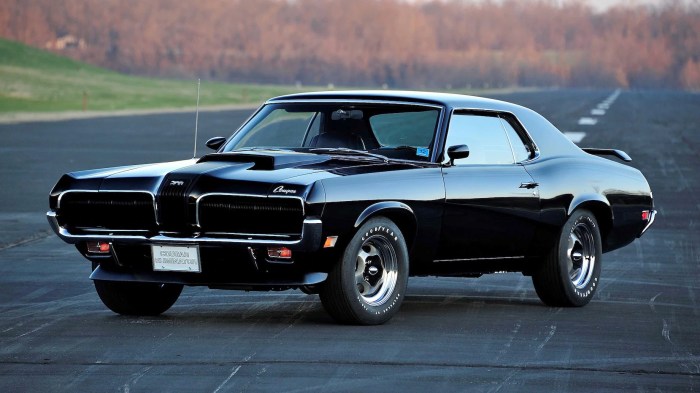
The 1970 Mercury Cougar, a stylish and powerful muscle car, featured a distinctive exterior design that embodied the spirit of the era. Its sleek lines and bold styling elements set it apart from other cars on the road.
Body Lines and Grille
The Cougar’s exterior design was characterized by its long, flowing lines and a distinctive front end. The body featured a long hood, a sloping roofline, and a pronounced rear deck. The grille was a prominent feature, featuring a large, horizontal chrome bar with a prominent Mercury emblem in the center.
The grille was flanked by rectangular headlights that gave the Cougar a distinctive look.
Trim Levels, 1970 Mercury Cougar
The 1970 Cougar was available in a variety of trim levels, each offering a unique blend of features and styling.
- Standard: The standard Cougar came with a variety of standard features, including a vinyl roof, full wheel covers, and a bench seat.
- XR-7: The XR-7 trim level was the top-of-the-line Cougar, featuring a luxurious interior, a vinyl roof, and a unique set of wheels. The XR-7 also included a number of standard features that were optional on the standard Cougar, such as power steering and power brakes.
- GT: The GT trim level was designed for performance and featured a number of upgrades, including a larger engine, a performance suspension, and a unique set of wheels. The GT also included a number of cosmetic enhancements, such as a blacked-out grille and a rear spoiler.
Optional Exterior Features
The 1970 Cougar offered a variety of optional exterior features that allowed buyers to customize their cars to their liking.
- Shaker Hood Scoop: The Shaker hood scoop was a popular option that added a touch of performance and style to the Cougar. The scoop was designed to direct air into the engine, which improved performance. The Shaker hood scoop was also a visually striking feature, and it helped to give the Cougar a more aggressive look.
- Marauder Package: The Marauder package was a performance-oriented option that included a number of upgrades, such as a larger engine, a performance suspension, and a unique set of wheels. The Marauder package also included a number of cosmetic enhancements, such as a blacked-out grille, a rear spoiler, and special badging.
The 1970 Mercury Cougar, a muscle car icon of the era, represented a significant shift in design compared to its predecessors. While the earlier Cougars drew inspiration from the sleek lines of the 1941 Mercury Custom 1941 Mercury Custom , the 1970 model embraced a more aggressive and muscular aesthetic, embodying the spirit of the American muscle car movement.
Interior Features and Comfort
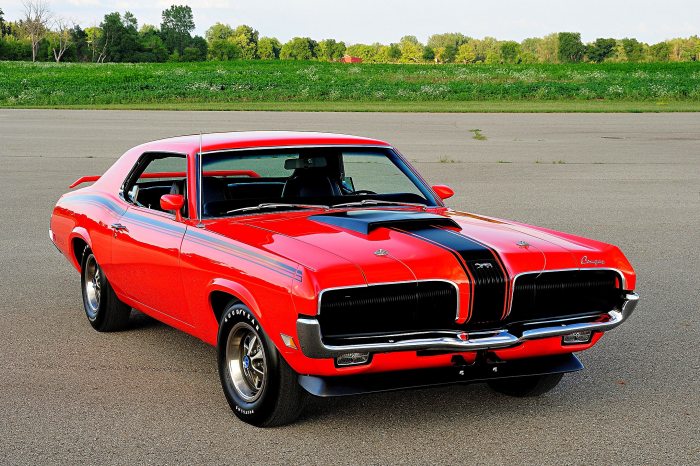
The 1970 Mercury Cougar’s interior was designed to provide a luxurious and comfortable driving experience. It featured a combination of high-quality materials and stylish design elements, reflecting the car’s sporty and sophisticated nature.
Seating and Comfort Features
The 1970 Cougar offered a range of seating options to suit different preferences and needs. The standard seating configuration included a bench seat in the front and a rear bench seat, providing ample space for five passengers. However, buyers could opt for bucket seats in the front, which provided more individual comfort and a sportier feel.
The 1970 Mercury Cougar, with its sleek lines and powerful engine, was a popular choice for muscle car enthusiasts. It shared a platform with the Ford Mustang, but offered a more luxurious and refined experience. While the Cougar was known for its sporty performance, its design was also influenced by the sleek and sophisticated 1969 Mercury Marauder , which further enhanced its appeal.
The Cougar’s success continued throughout the 1970s, cementing its place as a classic American muscle car.
The interior was upholstered in a variety of materials, including vinyl, cloth, and leather. Higher trim levels often featured leather upholstery, adding a touch of luxury to the cabin. The seats were designed for comfort and support, and many models came equipped with features like adjustable headrests, armrests, and reclining backrests.
Dashboard Layout and Instrumentation
The dashboard of the 1970 Cougar was a well-designed and functional space. It featured a clean and uncluttered layout, with easy-to-read gauges and controls. The instrument cluster typically included a speedometer, tachometer, fuel gauge, and temperature gauge. The dashboard was often finished in woodgrain or other decorative materials, adding a touch of elegance to the interior.
The car’s controls were well-placed and easy to use, allowing drivers to focus on the road ahead.
The 1970 Mercury Cougar, a classic muscle car, was a symbol of American automotive prowess. While its design reflected the spirit of the era, it lacked the sporty, European-inspired flair that characterized later models. This shift in design philosophy is evident in the 1993 Mercury Capri , which boasted a sleek, aerodynamic profile that aimed to capture the attention of a new generation of drivers.
However, despite its modern appeal, the 1993 Capri couldn’t quite match the raw power and charisma of its 1970 predecessor.
Engine Options and Performance
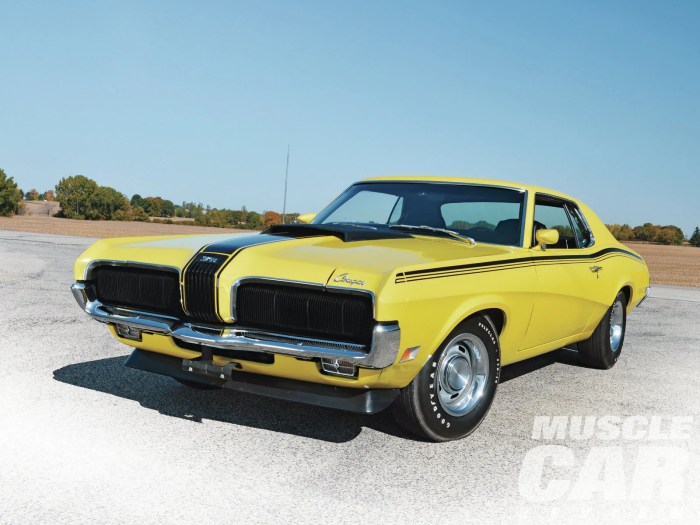
The 1970 Mercury Cougar offered a range of powerful engine options, catering to various performance desires. Each engine provided a distinct driving experience, with varying levels of horsepower, torque, and fuel efficiency.
Engine Options
The available engine options for the 1970 Cougar were:
- 351 cu in (5.7 L) Windsor V8:This engine was the standard option, producing 240 horsepower and 330 lb-ft of torque. It offered a good balance of power and fuel economy.
- 429 cu in (7.0 L) Cobra Jet V8:This powerful engine was an optional upgrade, generating 370 horsepower and 450 lb-ft of torque. It was designed for performance enthusiasts, delivering a thrilling driving experience.
- 428 cu in (7.0 L) Super Cobra Jet V8:This high-performance engine was available only on the Cougar Eliminator model. It produced 335 horsepower and 440 lb-ft of torque, and was equipped with a special camshaft and other performance modifications.
Transmission Options
The 1970 Cougar was offered with a choice of three transmissions:
- 3-speed automatic:This transmission was standard on all models and offered smooth and effortless shifting. It was well-suited for everyday driving but lacked the responsiveness of the manual transmission options.
- 4-speed manual:This transmission was available as an option and provided a more engaging driving experience. It allowed for greater control over gear selection, enhancing the car’s performance potential.
- Cruise-O-Matic 3-speed automatic:This transmission was a more advanced version of the standard 3-speed automatic, featuring a torque converter with a higher stall speed. This resulted in quicker acceleration and a more responsive driving experience.
Handling and Driving Experience
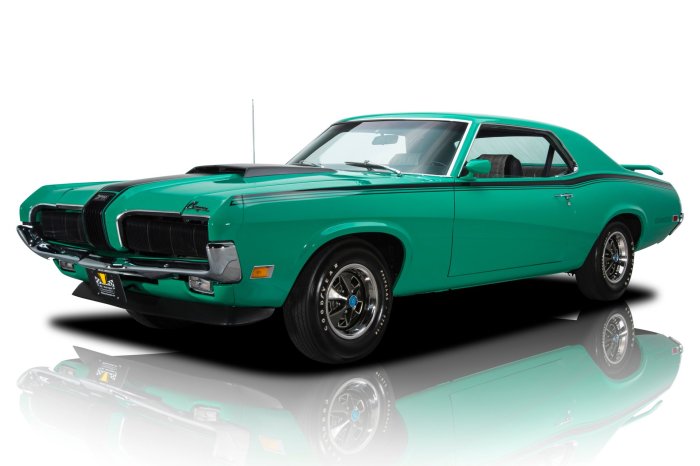
The 1970 Mercury Cougar, despite its size and luxurious appointments, was known for its surprisingly competent handling. This was largely due to its well-engineered suspension and a focus on driver engagement that was uncommon for American cars of the era.
Suspension and Steering
The Cougar’s suspension was a blend of comfort and control. It featured a front independent suspension with coil springs, ball joints, and an anti-roll bar. The rear suspension was a live axle with leaf springs. This setup provided a smooth ride while still offering a decent amount of grip and responsiveness.
The steering was precise and provided good feedback to the driver, allowing for confident handling on winding roads.
Driving Experience
The 1970 Cougar’s driving experience was a pleasant mix of comfort and performance. The car’s smooth suspension and well-damped ride provided a comfortable experience for passengers, while the responsive steering and powerful engine options made it enjoyable to drive.
The Cougar’s brakes were also effective, providing adequate stopping power for its size.
Comparison to Competitors
The 1970 Cougar’s handling and driving experience was considered superior to many of its competitors, particularly those from American manufacturers. While cars like the Chevrolet Monte Carlo and Pontiac Grand Prix offered similar levels of comfort and performance, the Cougar was generally considered to be more agile and engaging to drive.
It was also praised for its comfortable interior and its distinctive styling, which set it apart from the competition.
Legacy and Cultural Impact
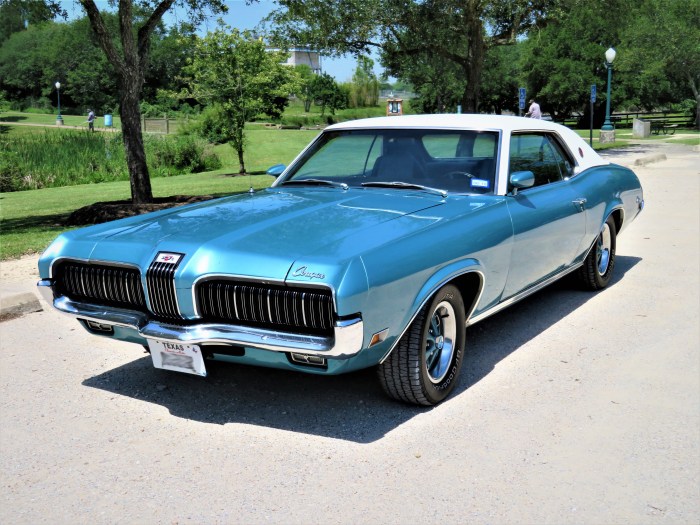
The Mercury Cougar, particularly the 1970 model, left a lasting mark on American automotive culture, embodying the spirit of the era and influencing the design and performance of future models. Its sleek design and powerful engine captured the imagination of a generation, contributing to its enduring popularity and cultural significance.
Cultural Impact of the 1970 Mercury Cougar
The 1970 Mercury Cougar became a symbol of the era’s growing interest in personal luxury and performance. Its sporty design and powerful engine options appealed to a wide range of buyers, from young professionals to established executives. It became a common sight on highways and in parking lots, representing a sense of style and sophistication.
The Cougar’s popularity also contributed to the rise of the “personal luxury car” segment, a category that would continue to grow in popularity throughout the 1970s and 1980s.
Notable Appearances in Popular Culture
The 1970 Mercury Cougar has appeared in various forms of popular culture, further solidifying its iconic status.
- In cinema, the Cougar has been featured in films such as “The French Connection” (1971), where it plays a crucial role in a high-speed chase scene, and “The Last American Hero” (1973), which showcases its performance capabilities.
- Television shows like “The Rockford Files” (1974-1980) featured the Cougar as a recurring vehicle, reflecting the car’s popularity among private investigators and detectives.
- Music videos and album covers from the 1970s also showcased the Cougar, further cementing its association with the era’s cultural trends.
Enduring Legacy and Influence
The 1970 Mercury Cougar’s influence extends beyond its cultural impact, shaping the design and engineering of subsequent model years. Its sleek, aerodynamic styling, inspired by the Ford Mustang, became a defining characteristic of the Cougar line. The car’s performance capabilities, particularly its powerful V8 engine options, also set a standard for future models.
The Cougar’s enduring legacy is evident in the continued production of the model through various generations, each building upon the foundation laid by the 1970 model.
Collecting and Restoring
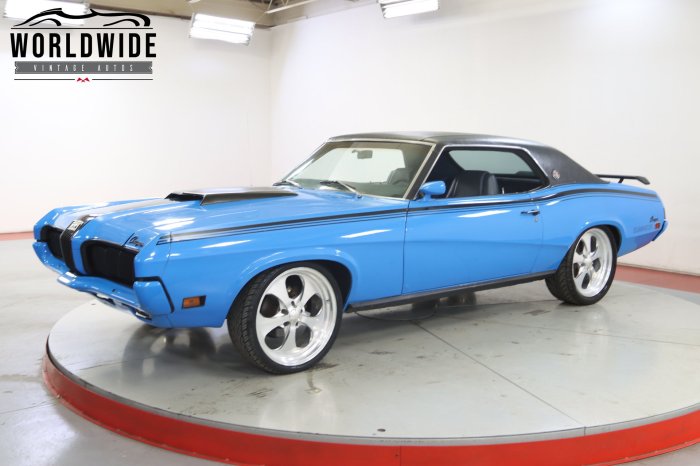
The 1970 Mercury Cougar, a classic muscle car with a unique blend of luxury and performance, has gained significant popularity among collectors. Its timeless design, powerful engine options, and historical significance make it a highly sought-after vehicle.
The Current Collector Market
The collector market for the 1970 Mercury Cougar is thriving, with enthusiasts actively seeking out well-preserved examples. The popularity of the model has led to a steady increase in values, especially for cars in excellent condition with original features.
Availability of Parts and Resources
Finding parts and resources for restoring a 1970 Mercury Cougar is generally straightforward, thanks to a robust aftermarket support network. Numerous specialized vendors offer a wide range of restoration parts, including body panels, trim pieces, interior components, and mechanical parts.
Value of Different Trim Levels and Conditions
The value of a 1970 Mercury Cougar varies significantly depending on its trim level, condition, and overall desirability. Here is a table highlighting the estimated values of different trim levels and conditions:
| Trim Level | Condition | Estimated Value |
|---|---|---|
| Standard | Excellent | $20,000
|
| XR-7 | Excellent | $25,000
|
| Eliminator | Excellent | $30,000
|
| Standard | Good | $10,000
|
| XR-7 | Good | $15,000
|
| Eliminator | Good | $20,000
|
Note: These values are estimates and can vary based on specific factors such as mileage, documentation, and overall desirability.
Outcome Summary
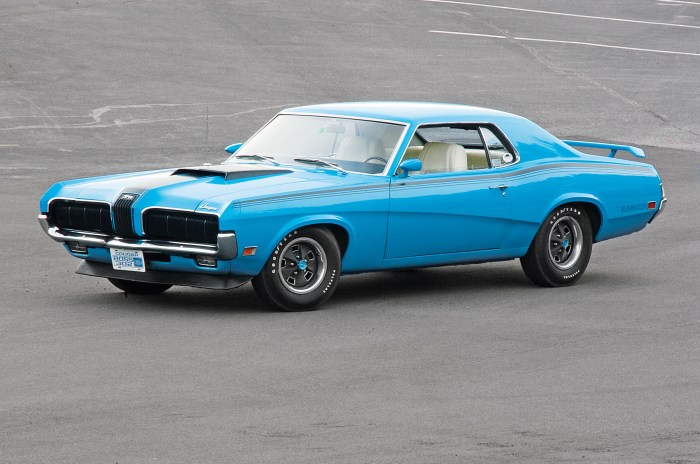
The 1970 Mercury Cougar stands as a testament to the golden era of American muscle cars, capturing the spirit of a generation that embraced performance and style. Its distinctive design, powerful engines, and enduring legacy continue to inspire enthusiasts today, ensuring its place as a coveted classic car.